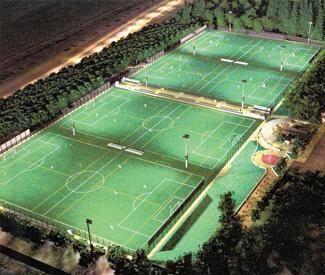Opponents of a city plan to install artificial turf soccer fields and stadium lights at the Beach Chalet soccer fields in Golden Gate Park — after losing at every stage of the project’s approval process — had their day in court Friday, beginning what could be their last chance: to have a judge block the project.
“I wouldn’t be surprised if these were the most heavily scrutinized soccer fields in the country,” attorney James Emery, who is representing the city and the project, said as he started off his opening arguments to defeat the lawsuit.
Groups including the SF Coalition for Children’s Outdoor Play and the Sierra Club’s San Francisco Bay Chapter filed a lawsuit based on the claim that the city violated the California Environmental Quality Act when it chose to use what the plaintiffs lawyers describe as “toxic turf.”
The main argument on the plaintiff’s side was that the styrene-butadiene rubber (SBR) that will be used for the fields is inherently toxic. Other arguments included the lack of hybrid alternatives on the Environmental Impact Report conducted for the fields, as well as deletion of emails by a city department.
Plaintiffs attorney Vernon Grigg started off with the assertion that the SBR turf being used for the soccer fields is made from crushed up tires “that aren’t even allowed in a landfill without a permit,” and that the EIR failed to offer other alternatives such as carpet pad rubber or cork.
His co-counsel Richard Drury also pointed out that SBR turf has a 18.8 in a million chance of causing cancer, exceeding the significant threshold of 10 in a million the Bay Area Air Quality Management District (BAAQMD) adopted in 2010.
Attorney Scott Emblidge, another lawyer contracted by the city on the case, said that wasn’t a standard that the city has adopted, criticizing the oft-repeated point by saying, “San Francisco has not formally adopted significance standards, though they have said it 17 times in their opening brief.”
But Drury emphasized that the city is compelled by CEQA to consider a less toxic option. “There are no alternatives to less toxic turf,” Drury said. “It wouldn’t have been hard for them to do that — they just didn’t do it.”
But Emblidge said the EIR didn’t identify the turf choice as significantly toxic, a point Drury disputed.
“The EIR does mention alternative forms, and does discuss alternative turf composition,” Drury said. “They consistently covered that there were significant health effects. There’s lots of speculation, but nothing that truly shows it.”
Other points were made that people within the Recreation and Parks Department were deleting emails related to the project, but coverage on that subject ran short as Judge Teri L. Jackson had to leave the court because of other engagements.
Attorneys for both sides are scheduleed to meet on Wednesday to be questioned further by Jackson.

